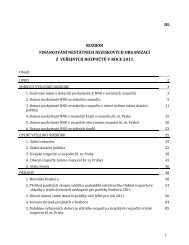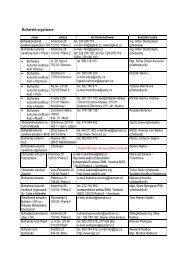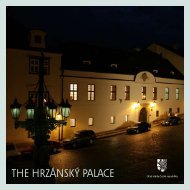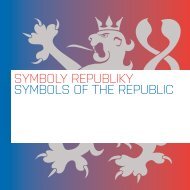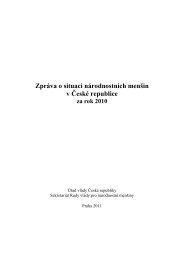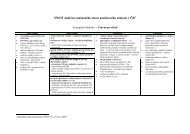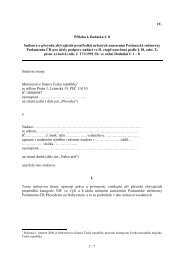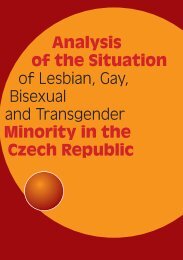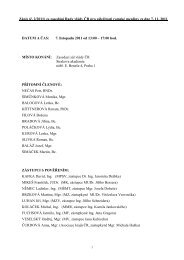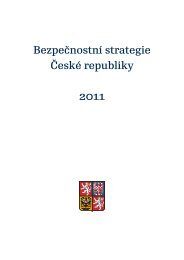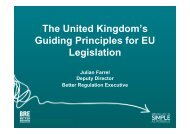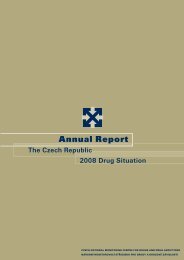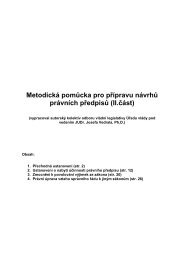The Czech Republic Annual Report 2010 Drug ... - Drogy-info.cz
The Czech Republic Annual Report 2010 Drug ... - Drogy-info.cz
The Czech Republic Annual Report 2010 Drug ... - Drogy-info.cz
Create successful ePaper yourself
Turn your PDF publications into a flip-book with our unique Google optimized e-Paper software.
partly also by regional public health authorities. <strong>The</strong> National Institute of Public Health implemented a number of<br />
activities in this area in <strong>2010</strong>. <strong>The</strong> local health promotion offices in the regions of the <strong>Czech</strong> <strong>Republic</strong> implemented a<br />
number of intervention activities, including lectures, talks, and the distribution of health educational. <strong>The</strong> National<br />
Institute of Public Health also coordinated the Health Promoting Schools programme and organised accredited<br />
training programmes for education professionals working in kindergartens and basic and secondary schools –<br />
including one entitled How (Not) To Become a Junkie, a course designed to provide an overview of the methodology<br />
of this interactive game for children.<br />
As regards the regional public health authorities, the scope of their activities and focus of health policy and health<br />
promotion varies across the different regions. In general, however, the regional public health authorities in some<br />
regions also contributed to primary drug prevention in <strong>2010</strong>, delivering lectures, talks, collaborating – to a varying<br />
extent – with regional drug coordinators, participating in regional drug policy working groups or commissions, etc.<br />
3.2 Universal Prevention<br />
<strong>The</strong> Minimum Prevention Programme is the fundamental strategy of risk behaviour prevention in schools and<br />
educational facilities, drawn up by the school prevention worker in collaboration with the school management and<br />
other education professionals. <strong>The</strong> Minimum Prevention Programme is subject to checks by the <strong>Czech</strong> Schools<br />
Inspectorate. <strong>The</strong> most frequently reported shortcomings of the school minimum prevention programmes in <strong>2010</strong>, as<br />
in the previous years, included a shortage of funds to implement prevention activities, low levels of support for the<br />
school prevention workers from the school management, and the perfunctory nature and fragmented structure of the<br />
minimum prevention programmes. Schools can implement prevention activities on their own or in cooperation with<br />
external entities (such as NGOs or the Police of the <strong>Czech</strong> <strong>Republic</strong>).<br />
A number of major prevention programmes of national importance were under way in <strong>2010</strong>.<br />
<strong>The</strong> implementation of the international Unplugged prevention programme (part of the EU-Dap 2 project) entered its<br />
final phase in the <strong>Czech</strong> <strong>Republic</strong>. <strong>The</strong> programme is aimed at preventing the use of addictive substances (alcohol,<br />
tobacco, and illicit drugs) by pupils in the 6th grade, i.e. children aged 12–14. <strong>The</strong> research project is being<br />
implemented in 70 schools (an experimental group of 966 pupils from 37 schools; a control group of 888 pupils from<br />
33 schools). <strong>The</strong> sixth and final round of data collection was carried out in June <strong>2010</strong> – for more <strong>info</strong>rmation see the<br />
2009 <strong>Annual</strong> <strong>Report</strong>. In this project, another 46 education professionals were trained in the Olomouc, Ústí nad<br />
Labem, and Brno regions in <strong>2010</strong>. <strong>The</strong> dissemination of the methodology was coordinated by the Centre for<br />
Addictology in cooperation with regional institutions. <strong>2010</strong> also saw the establishment of a new team of certified<br />
trainers who will participate in disseminating the methodology for the Unplugged prevention programme in other<br />
parts of the <strong>Czech</strong> <strong>Republic</strong>. A total of 120 people (mostly education professionals) were trained in the methodology<br />
of the Unplugged programme between 2006 and the end of <strong>2010</strong>. Evaluation two years after the completion of the<br />
programme performed on a sample of pupils who enrolled in the Unplugged programme, compared with the control<br />
group (a total of 1,761 students, average age 14.1, the proportion of boys being 51.5%) showed that students<br />
enrolled in the programme exhibit statistically significantly lower rates of smoking, frequent smoking, frequent<br />
inebriation, frequent cannabis use, and the use of any drug. A borderline effect was found for daily smoking. <strong>The</strong><br />
authors conclude that Unplugged is an effective prevention programme for elementary schools and recommend it to<br />
be applied nationwide (Gabrhelik et al. 2011).<br />
Another research project is a longitudinal study implemented by the Faculty of Education and the Faculty of Medicine<br />
at Masaryk University in Brno, focusing on the primary prevention of smoking and health promotion among the target<br />
group of children aged 7–11. <strong>The</strong> output of the project in <strong>2010</strong> consists of five manuals for the educational<br />
programme Non-Smoking Is Normal for pupils in the first to fifth years of elementary schools, including a video/DVD<br />
and a health mascot. <strong>The</strong> programme is unique in that the intervention targets children of early school age (6 to 11).<br />
<strong>The</strong> programme has a positive influence mainly on the cognitive components of personality (Hrubá and Žaloudíková,<br />
2011).<br />
In <strong>2010</strong> the Centre for Addictology participated in an international study, Empowering Families: Increasing family<br />
skills to work towards preventing alcohol use and drug-related problems 41 . <strong>The</strong> project aims to map the potential<br />
preventive effects of the family in reducing undesirable forms of addictive behaviour in children and adolescents and<br />
the involvement of entire families in prevention. <strong>The</strong> key component of the study is a questionnaire survey among<br />
children in the school class and their parents that focuses on risk and protective factors in the family.<br />
3.3 Selective prevention<br />
Selective prevention programmes are focused on vulnerable groups of the population showing a higher risk of<br />
addictive substance use. From a long-term perspective, the use of addictive substances among children and<br />
adolescents from ethnic minorities in the <strong>Czech</strong> <strong>Republic</strong> is a serious problem which has not been managed<br />
sufficiently.<br />
41<br />
European Family Empowerment: Improving family skills to prevent alcohol and drug-related problems (JLS/DPIP/2008-2/112).<br />
page 44



